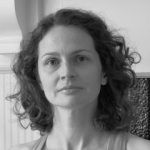Jessica Cuello, Guest Contributor
Book Review: Where They Would Never Be Invited by Jesse Nissim
San Francisco, CA: Black Radish Books, 2016. 56 pages. $17.00.
When I was a little girl—and even now—I stared into the windows of houses. Inside other houses was ideal love and emotional fulfillment. Even my dreams were filled with houses where I wandered, searching for my own psyche. Jesse Nissim’s Where They Would Never Be Invited literally peers into one of our most primal needs: the desire for home.
The book is divided into three long poems: All Entrances, Open House, and Nesting Instinct, and in them, Nissim evokes an old idea—that the reason we linger over architecture and objects in the first place is because we project ourselves onto them. The poems exude loneliness, and often a heart-wrenching emptiness, while depicting the most vulnerable parts of people without the presence of people.
In a strange and luminous way, the physical elements of the house overpower the human. The humans remain at a distance, seeking intimacy and safety via a home’s interior: “Late at night I covet the warmest / feeling the tile anticipates. / I want an easy refuge I can touch / I seek freezers fully stocked.”
Yet Nissim reminds the reader that houses fail to protect. The material world is just as ephemeral and even more fragile than our intangible longings. It too can be sold to us and taken from us. It too can offer to fulfill our desires and leave us empty. So too can it fail to protect us from the elements:
A tornado opened a surprise
in the vicinity of nestled children.
No coastline grumbled a response.
A schoolhouse whose nameplates
disappeared when all the windows
lifted up. Signs and critics and
replicas rushed in like water views
skewered on unsuspecting buildings.
Yes, I have heard of the sea. Have you
heard it filling with debris?
Nissim dismantles the brick and mortar of homes and reveals them to be thinly disguised dreams. Whatever we hope to control by living within a home, whatever we hope to preserve, is no safer than anything else. In poem one, “All Entrances,” she writes:
I build the house eternally a mechanical enclosure
with sharply bolted doors. Translucent delusions
Not only does Nissim tear apart the market lie and the promises of advertisers, she reveals that home ownership is part of a larger American mythology. Nissim writes, “I want to suggest a bigger more opulent guilt / about the subject. The dream—no longer / a new-placed “stable” star—now has / beautiful cost-lines and cranky stains.” In emotionally charged images, Nissim shows how “We participate in the human nourishment” and have ingested the images of domesticity and intimacy from the housing market. She writes:
Years boxed for reassembly
to know covetous lineage
brick by brick and the gilded
furniture. Vast near the coast
of cavernous spaces, sometimes
there is a tapestried doorway
covering God’s money.
The poems draw not only on our desires—what we wish houses would do for us—but on the economic realities of the 2008 housing market crash. Nissim states in her acknowledgements that she “started this book amidst the economic recession and the resulting housing crisis of 2008.”
Lines like “The narcissistic wound / humiliated our walls. / We were a bad reputation,” encapsulate how houses conflate our emotional desires with materialism.
Home becomes a physical reminder of human failure: “Throughout my displacement my dreams / have become ordinary. The wish language / of desire is unmet…”
The language underscores the resulting demoralization and fear connected to losing one’s home. If we are homeless are we also nameless? Are we without family? Are we a loser as a father? As a mother? Homes are falsely tied to our identity and value:
Despite wide lawns a house is symptomatically
nameless. Part deserted or debased, a few paces
ahead a glorified symmetry. A father.
His enchantment. His blank step before him.
Part of the beauty in this book is in the depiction of the objects themselves; Nissim captures the spookiness of an object without an owner, and the poems themselves are endowed with the kind of charge that objects deeply associated with humans exude. The poems are both tender and electric. Houses represent an essential desire for safety—for arrival at a place free from fear—and Nissim demonstrates that it is not possible, that this hope has been made impossible. It is a lie that wounds those who believe in it. Nissim looks sympathetically at the human cost of that lie and, in fact, lays a partial groundwork for our current historical moment post-election.
≅

Jessica Cuello is the author of Pricking (Tiger Bark Press, 2016) and Hunt, which was selected as the winner of The 2016 Washington Prize from The Word Works. She is also the author of three chapbooks and a recipient of The New Letters Poetry Prize, a Saltonstall Fellowship, and The Decker Award for outstanding teaching.
